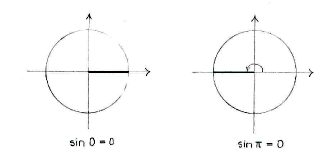Solution 4.4:2c
From Förberedande kurs i matematik 1
(Difference between revisions)
(Ny sida: {{NAVCONTENT_START}} <center> Bild:4_4_2c.gif </center> {{NAVCONTENT_STOP}}) |
m |
||
| (4 intermediate revisions not shown.) | |||
| Line 1: | Line 1: | ||
| - | + | There are two angles in the unit circle, <math>x=0</math> and <math>x=\pi</math>, whose sine has a value of zero. | |
| - | < | + | |
| - | {{ | + | [[Image:4_4_2_c.gif|center]] |
| + | |||
| + | We get the full solution when we add multiples of <math>2\pi</math>, | ||
| + | |||
| + | {{Displayed math||<math>x = 0+2n\pi\qquad\text{and}\qquad x = \pi + 2n\pi\,,</math>}} | ||
| + | |||
| + | where ''n'' is an arbitrary integer. | ||
| + | |||
| + | |||
| + | Note: Because the difference between <math>0</math> and <math>\pi</math> is a half turn, the solutions are repeated every half turn and they can be summarized in one expression, | ||
| + | |||
| + | {{Displayed math||<math>x=0+n\pi\,,</math>}} | ||
| + | |||
| + | where ''n'' is an arbitrary integer. | ||
Current revision
There are two angles in the unit circle, \displaystyle x=0 and \displaystyle x=\pi, whose sine has a value of zero.
We get the full solution when we add multiples of \displaystyle 2\pi,
| \displaystyle x = 0+2n\pi\qquad\text{and}\qquad x = \pi + 2n\pi\,, |
where n is an arbitrary integer.
Note: Because the difference between \displaystyle 0 and \displaystyle \pi is a half turn, the solutions are repeated every half turn and they can be summarized in one expression,
| \displaystyle x=0+n\pi\,, |
where n is an arbitrary integer.

